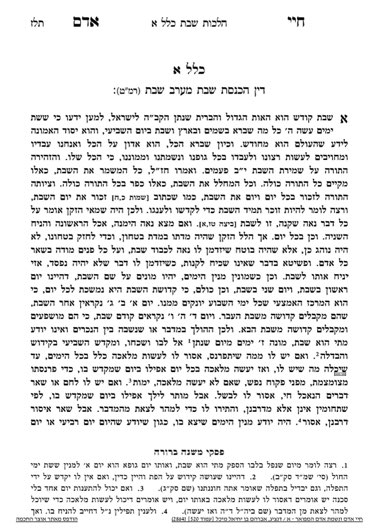We are continuing in siman 1, discussing the mitzvah of zachor es yom hashabbos lekadesho. The Chayei Adam discusses a situation in which a person loses count of the days of the week. The Gemara gives the example of a person lost in the desert. Since one is only allowed to perform melacha on Shabbos for a life-sustaining need, the halacha is that the person can do enough melacha on each day in order to sustain himself for that day. They are also allowed to perform any melacha necessary to leave the situation (e.g., to get out of the desert), so that they are not stuck in this situation for the rest of their life.
Regarding the positive aspects of Shabbos, such as kiddush and davening, one would have thought that each day is a safeik whether it is Shabbos, so it would be a safeik bracha levatala to recite kiddush. However, the halacha is that from the day one lost count, they count seven days, and on that seventh day, they recite kiddush and the tefillos of Shabbos. Rashi explains that this is in order to ensure that the person does not forget the concept of the positive mitzvos of Shabbos.
The Chayei Adam adds another point. If a person says kiddush on a day which may not be Shabbos, there is a 1 in 7 chance that it is Shabbos, and a 6 in 7 chance (85 percent) that it is not Shabbos. It should be considered a sheker and bracha levatala. The Chayei Adam explains that since the kedusha of Shabbos extends to the entire week (see previous shiur), each day of the week has a little of Shabbos in it, so it is not totally incorrect to say the words mekadeish Hashabbos in kiddush and in davening.
The teshuvos Radvaz takes this concept a little further. He writes that the mitzvah is to speak about how Shabbos is unique and special. If so, this person is doing exactly that; he is stopping every seven days and stating how Shabbos is unique. The Radvaz holds that the person fulfills the mitzvah deoraysa of zachor es yom hashabbos lekadesho, because they are fulfilling this idea of stating that uniqueness.
Although we have mentioned a few ways in which a person fulfills the mitzvah of zachor es yom hashabbos lekadesho, the most obvious is to recite kiddush, which we will discuss at length, be’ezras Hashem.
There are a few more points regarding the mitzvah of zachor es yom hashabbos lekadesho.
The Mechilta says that one fulfills the mitzvah of zachor es yom hashabbos lekadesho when a person learns hilchos shabbos. Every time a person learns hilchos Shabbos, they are preparing for shabbos by learning the relevant halachos.
The Chofetz Chaim wrote a sefer called Ahavas Chesed. In the back, he published a list of personal kabbalos (personal practices) of a tzaddik known as Rav Yonasan Voliner, who had lived in the generation before the Chofetz Chaim. He titled the list marganisa tava, a precious pearl [of wisdom]. One of Rav Yonasan’s kabbalos was that every time he did something during the week which would be prohibited to do on Shabbos, he would speak out that it may not be done on Shabbos. The point was to strengthen his keeping of Shabbos. This is a kiyum of Zachor and arguably he was also fulfilling the mitzvah of shamor es yom hashabbos, (which we will discuss as well, be’ezras Hashem).
Summary
The mitzvah of zachor es yom hashabbos lekadesho teaches that one should have Shabbos in mind already from the beginning of the week. We fulfill this mitzvah in a few ways:
- To purchase items lchavod Shabbos as they present themselves throughout the week.
- To verbalize that the purchase is for Shabbos when making the purchase.
- To count the days of the week based on Shabbos, by saying that today is the __ day of Shabbos.
- By learning the halachos of Shabbos
- Rav Yonasan Berliner would fulfill this mitzvah by stating during the week, every time that he was about to do something which would have been assur on Shabbos, that the action he is about to do is assur on Shabbos.
This mitzvah also teaches us that since the kedusha of Shabbos extends into the entire week, if one loses count of the days of the week and no longer knows which day is Shabbos, they count seven days and consider the seventh day as Shabbos. Even if they are incorrect as far as the calendar is concerned, they are able to recite kiddush and daven, because this concept extends Shabbos into the rest of the week.



